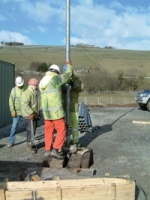Harnessing hot rocks
A twin-borehole system in Durham will heat water for use in a geothermal power plant by cycling it 1km underground.

Newcastle University engineers are planning to develop a power plant on former cement works in County Durham that will harness heat from deep underground.
The twin-borehole geothermal system will allow water to be continually cycled through a maze of granite fractures as deep as 1km, where it will be heated up to temperatures of 30°C or more, then brought up to the surface and passed through heat exchangers before being returned underground to be re-heated.
According to project leader Prof Paul Younger of Newcastle University, the system will provide renewable energy for homes and businesses in the planned Eastgate eco-village in Weardale, County Durham, complementing four other forms of renewable energy - solar, wind, biomass and hydro - that are also harnessed there.
Aside from heating homes and businesses, some of the natural hot water will also be used in a spa - the first such development in the UK since the Romans tapped the hot springs at Bath. It will also be used to provide an environment for farming Tilapia fish, an alternative to cod that thrives in warm water.
Register now to continue reading
Thanks for visiting The Engineer. You’ve now reached your monthly limit of premium content. Register for free to unlock unlimited access to all of our premium content, as well as the latest technology news, industry opinion and special reports.
Benefits of registering
-
In-depth insights and coverage of key emerging trends
-
Unrestricted access to special reports throughout the year
-
Daily technology news delivered straight to your inbox










Water Sector Talent Exodus Could Cripple The Sector
Maybe if things are essential for the running of a country and we want to pay a fair price we should be running these utilities on a not for profit...